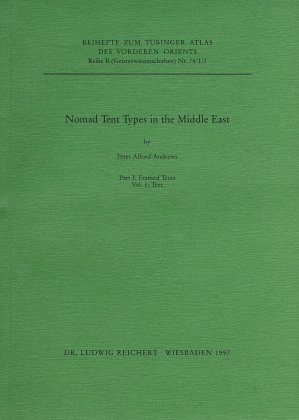
Nomad Tent Types in the Middle East
Seiten
1996
Reichert, L (Verlag)
978-3-88226-890-4 (ISBN)
Reichert, L (Verlag)
978-3-88226-890-4 (ISBN)
This is the first book to attempt a comprehensice treatment of the wide variety of nomad tents still in use in the Middle East: it is both architectural and ethnographical. It draws primarily on the author's own extensive fieldwork sind 1967, providing largely first-hand information on a fascinating but badly-neglected area of architecture. He began the task of recording these traditions with a sense of urgency, as they seemed threatened with imminent extinction. The survey was therefore made in sufficient detail to allow the tents to be reconstructed. Changes over the last thirty years have in fact led to reductions in the number of nomads, severe weakening of their economy, the intrusion of new materials, and the adoption of mechanised ransport; some, but not all, of the types studied have indeed disappeared. Information on areas not visited by the author has been contributed by ethnologist colleagues, who share his admiration for a closeness of fit between the rigorous constraints of nomadic life and a response arrived at through more than a millenium of experience and craftmanship.
Throughout, the work emphasises the ethnological context in which these dwellings are used. Each type is first located as exactly as possible, named, and given a short historical background; its general characteristics are summarised, and it is considered in relation to other, comparable types. Its structure and covering are then described in full detail, together with the processes of manufacture, maintenance, operation, transport, and the procedures followed for pitching and striking. Variations in the plan and internal arrangements are discussed in relation to ownership and residence, and the principal moments in the life cycle of the inhabitants, at marriage, the inauguration of the household, the birth of a son, and inheritance. Local terms are given for the parts and processes. Camping patterns, migrations and camp planning are explained, and details of the climate of the areas concerned. Each tent is represented in measured drawings or sketches with photographs.
The classification in the book relates to the map of nomadic tent types already published by the author (TAVO A IX 5, Reichert 1990), grouping the tents according to structural type and ethnic group; 56 types are described, together with some related hut types. These two volumes, on tents with rigid, self-supporting frames, are the first part of the work. The second part, also in two volumes, and now being prepared, will deal with the black tension-tents.
The author, a qualified architect, took his doctorate at the School of Oriental and African Studies, University of London, in 1980. He has been working at the Institute for Ethnology, Cologne University, since 1981, and with the Central Asian Seminar, University of Bonn, since 1992. He held the Endowed Professorship for Islamic Art and Archaeology at the University of Bamberg in 1990-91.
Throughout, the work emphasises the ethnological context in which these dwellings are used. Each type is first located as exactly as possible, named, and given a short historical background; its general characteristics are summarised, and it is considered in relation to other, comparable types. Its structure and covering are then described in full detail, together with the processes of manufacture, maintenance, operation, transport, and the procedures followed for pitching and striking. Variations in the plan and internal arrangements are discussed in relation to ownership and residence, and the principal moments in the life cycle of the inhabitants, at marriage, the inauguration of the household, the birth of a son, and inheritance. Local terms are given for the parts and processes. Camping patterns, migrations and camp planning are explained, and details of the climate of the areas concerned. Each tent is represented in measured drawings or sketches with photographs.
The classification in the book relates to the map of nomadic tent types already published by the author (TAVO A IX 5, Reichert 1990), grouping the tents according to structural type and ethnic group; 56 types are described, together with some related hut types. These two volumes, on tents with rigid, self-supporting frames, are the first part of the work. The second part, also in two volumes, and now being prepared, will deal with the black tension-tents.
The author, a qualified architect, took his doctorate at the School of Oriental and African Studies, University of London, in 1980. He has been working at the Institute for Ethnology, Cologne University, since 1981, and with the Central Asian Seminar, University of Bonn, since 1992. He held the Endowed Professorship for Islamic Art and Archaeology at the University of Bamberg in 1990-91.
| Erscheint lt. Verlag | 25.11.1996 |
|---|---|
| Reihe/Serie | Reihe B (Geisteswissenschaften) | Tübinger Atlas des Vorderen Orients (Beihefte) ; 74 |
| Zusatzinfo | 144 Tafeln mit Zeichnungen |
| Verlagsort | Wiesbaden |
| Sprache | englisch |
| Maße | 200 x 280 mm |
| Gewicht | 2066 g |
| Themenwelt | Naturwissenschaften ► Geowissenschaften ► Geografie / Kartografie |
| Sozialwissenschaften ► Ethnologie ► Völkerkunde (Naturvölker) | |
| Schlagworte | Kurdistan • Nahost / Naher Osten; Völkerkunde • Nahost; Völkerkunde • Nomade • Nomaden • Orient, Geschichte; Vor-/Früh-G. • Türkei • Türkei;Nomade;Volkskunde;Völkerkunde;Kurdistan;Zelt; • Türkei /Volkskunde; Völkerkunde; Kurdistan /Volkskunde; Völkerkunde; Nomade; Zelt • Völkerkunde • Völkerkunde;Nomade;Volkskunde / Völkerkunde;Zelt;Türkei /Volkskunde;Kurdistan /Volkskunde; • Volkskunde • Zelt |
| ISBN-10 | 3-88226-890-5 / 3882268905 |
| ISBN-13 | 978-3-88226-890-4 / 9783882268904 |
| Zustand | Neuware |
| Haben Sie eine Frage zum Produkt? |
Mehr entdecken
aus dem Bereich
aus dem Bereich
über eine faszinierende Welt zwischen Wasser und Land und warum sie …
Buch | Hardcover (2023)
dtv (Verlag)
24,00 €
Buch | Hardcover (2024)
Schweizerbart'sche, E. (Verlag)
24,00 €
Eine Einführung in die spezielle Mineralogie, Petrologie und …
Buch | Hardcover (2022)
Springer Spektrum (Verlag)
59,99 €


